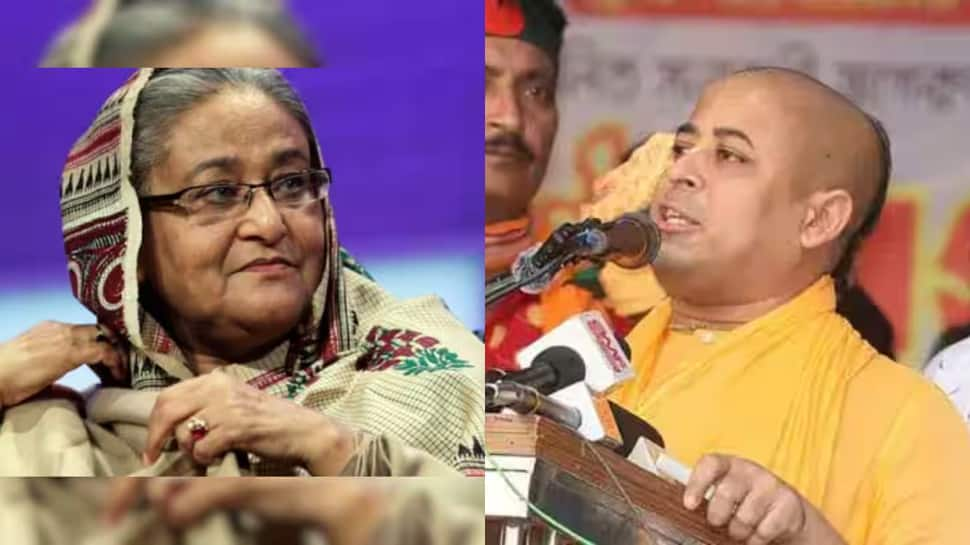 |
|
The recent arrest of Chinmoy Krishna Das Brahmachary, a prominent leader within the Sanatan religious community in Bangladesh, has sparked intense political controversy and reignited concerns about religious freedom and human rights within the nation. Former Prime Minister Sheikh Hasina, leader of the Awami League, has issued a strong condemnation of the arrest, directly criticizing the current interim government led by Chief Adviser Muhammad Yunus. Hasina's statement, delivered through her party's official X account, highlights a deepening political and social crisis within Bangladesh, characterized by escalating violence, alleged human rights abuses, and a perceived lack of protection for religious minorities.
Hasina's criticism extends beyond the arrest of Brahmachary. She directly accuses the Yunus administration of failing to maintain law and order, citing instances of violence against religious minorities, including the burning of a Hindu temple in Chattogram and the fatal attack on a lawyer during a clash between security personnel and Brahmachary's activists. This lawyer’s death, she insists, constitutes a grave violation of human rights, demanding swift action against those responsible. She labels the perpetrators as “terrorists” and underscores the need for justice and accountability. The specific context of Brahmachary’s arrest—a sedition case stemming from a skirmish—further complicates the issue, painting a picture of escalating tensions and potential governmental overreach.
The timing of Hasina’s condemnation is significant. She delivered her statement after leaving Bangladesh for India amidst widespread protests against her own government. This adds a layer of political maneuvering to the situation, suggesting that her criticism is not solely based on concern for human rights but also serves as a political attack on her rivals. Hasina’s departure, followed shortly by the appointment of Yunus, creates a backdrop of political instability that is inextricably linked to the ongoing unrest and concerns regarding human rights within Bangladesh.
Beyond the immediate events surrounding Brahmachary’s arrest and the lawyer’s murder, Hasina raises broader concerns about the deteriorating state of human rights and the rising tide of extremism in Bangladesh. She points to the declining Hindu population, dropping from 22% at the time of the Liberation War to approximately 8% today, as a direct consequence of years of social and political exclusion and targeted violence. This statistic underlines the fragility of religious harmony and the systemic challenges facing religious minorities in the country. The rise of groups like Jamaat-e-Islami, she argues, exacerbates these concerns, signifying the growing threat of religious extremism and intolerance.
Hasina's statement acts as a stark warning to the current interim government. She explicitly threatens repercussions for Yunus's administration if it fails to bring those responsible for the violence to justice, arguing that a failure to do so would constitute a human rights violation. This directly challenges the legitimacy and authority of the Yunus government, raising the stakes in the already tense political climate. The underlying message is clear: the treatment of religious minorities and the maintenance of law and order are not merely internal affairs but also crucial components of the country’s overall stability and international standing.
The situation in Bangladesh, as highlighted by Hasina's statement, is fraught with complexity. It involves intricate political dynamics, deep-seated social tensions, and serious human rights violations. The arrest of Brahmachary, the murder of the lawyer, and the broader concerns raised by Hasina are not isolated incidents but symptomatic of a deeper crisis of governance, religious tolerance, and the rule of law. The international community, as well as concerned citizens within Bangladesh, will be watching closely to see how the Yunus administration responds to these accusations and whether steps are taken to address the underlying causes of the violence and protect the rights of all citizens, regardless of their religious affiliation.
Source: 'Top Leader Of The Sanatan...': Sheikh Hasina Condemns Arrest Of ISKCON Monk, Slams Bangladesh Govt
